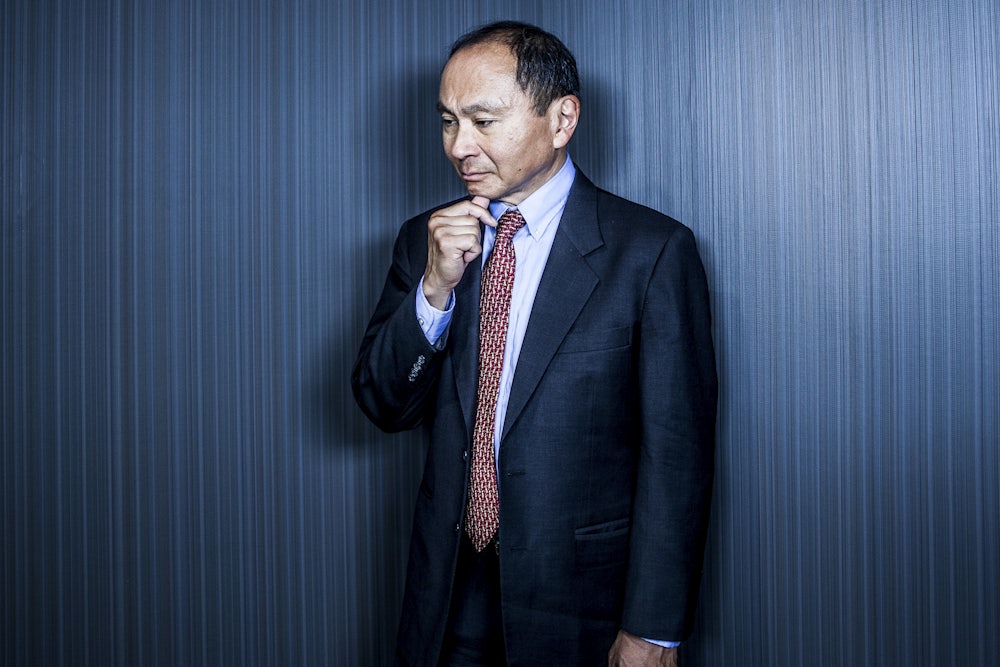In his recently published study Identity: The Demand for Dignity and the Politics of Resentment, Francis Fukuyama wants to modify his best-known thesis, published first as a 1989 essay, “The End of History?,” then as a book-length treatment in 1992, The End of History and the Last Man. The word “end,” he now says, was not meant in the sense of “termination,” but rather signified “target” or “objective”; similarly, “history” was referencing the process of “development” or “modernization,” not recorded time. Marx had argued that, in his own interpretive scheme, the historical process would culminate in a communist utopia; Fukuyama says that in his end-of-history thesis he was supplying a more moderate and measured gloss on Marx, employing instead Hegel’s version of the dialectic’s endpoint: a “liberal state linked with a market economy.”
There is much wrong here. To begin with, Hegel was not an advocate of liberal democratic capitalism. He critiqued both political and economic liberalism for promoting a selfish individualism inimical to community, his highest political ideal. Fukuyama was working from the idiosyncratic reading of Hegel supplied by Alexandre Kojève, a Russian émigré who conducted a series of legendary seminars on the subject in Paris in the 1930s. According to Shadia Drury, a chronicler of the intellectual roots of modern neoconservatism, Kojève’s Hegelian teachings—which also strongly referenced the Nietzschean idea of the Superman—proved very influential in the development of postwar existentialism and postmodernism.
In The End of History and the Last Man, Fukuyama argues that liberal capitalist democracy satisfies what Plato contended were the three basic needs of the soul: The rational side of capitalism facilitates the desiring part’s appetite for material goods, while the liberal-democratic political order confers on its citizens the dignity of political equality and individual rights. But Fukuyama vacillates throughout on how great a threat aspiring Supermen in the Nietzschean mold might pose to the peace at the end of history. In The End of History and the Last Man, he actually singles out Donald Trump as a successful capitalist who might still seek affirmation beyond mere financial accomplishment, and might conceivably pose a danger to the nation if he were to choose to enter politics.
Fukuyama was originally an elitist pessimist of the old neoconservative school; he studied Western philosophy with Allan Bloom (himself a student of Leo Strauss) in his undergraduate years at Cornell. But Fukuyama seems to have finally made a break from the profound cultural pessimism of the Straussian neocons. Liberalism, as Fukuyama notes, has from the beginning presented itself as a universal creed, calling for the extension of basic political rights to every citizen, even if those rights have not often been evenly or justly enforced, Recently, historically excluded subgroups within liberal political orders have organized to achieve equal status for their groups qua groups. One prominent recent instance of this demand for identity and recognition has been the gay community’s campaign for the right to marry same-sex partners. Fukuyama also mentions parallel efforts from a host of other historically marginalized subgroups, such as the disabled, African Americans in areas where there is routine police violence, Native Americans, immigrants, and transgender individuals. He commends their achievements, but cautions that neither the American left, as a movement, nor the nation as a whole can function and prosper if it functions as a congeries of disparate, impermeable subgroups. And here is where civic republicanism comes in; where the ambitions of liberalism as a universal-rights–based creed appear to be succumbing to the pressures of ethno-nationalist reaction on the right and identity-based agitations for recognition on the left, the particularist, historically informed character of the republican tradition may prove more adaptable to the world’s shifting and radically contingent political landscape. Where the liberal order envisioned as the summit of political development in The End of History and the Last Man has grown notably brittle, hidebound, and inward-looking, the participatory and locally embedded traditions of republicanism, aimed at cultivating virtue and self-sacrifice as a civic bulwark against the corrosive forces of vice, luxury, and atomistic individualism, now speak to an increasingly unmoored political age with fresh urgency.
In the chastened pages of Identity, Fukuyama himself concedes as much: “Democracies require certain positive virtues on the part of citizens...,” he writes:
Alexis de Tocqueville in particular warned of the temptation of people in democratic societies to turn inward and preoccupy themselves with their own welfare and that of their families exclusively. Successful democracy, according to him, requires citizens who are patriotic, informed, active, public-spirited, and willing to participate in political matters. In this age of polarization, one might add that they should be open-minded, tolerant of other viewpoints and ready to compromise their own views for the sake of a democratic consensus.
This is a perfect description of the republican political ethic—as well as of the public-minded virtues most lamentably absent from American politics today.
